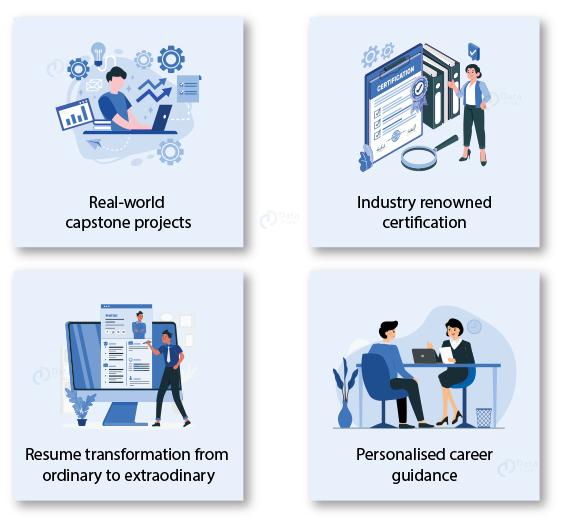Free MongoDB Certification Course
 The management and organization of data in contemporary applications has been completely transformed by the use of MongoDB, a top NoSQL database. MongoDB is a document-oriented database, as opposed to conventional relational databases, and it provides a flexible and scalable method of data storing.
The management and organization of data in contemporary applications has been completely transformed by the use of MongoDB, a top NoSQL database. MongoDB is a document-oriented database, as opposed to conventional relational databases, and it provides a flexible and scalable method of data storing.
What will you take home from this Free MongoDB Course?
- Self-paced video course
- 170+ hrs of study material, practicals, quizzes
- Acquire practical knowledge which industry needs
- Practical MongoDB course with real-time case-studies
- Lifetime access with industry renowned certification
Why should you enroll in this Free MongoDB course?
- Familiarity with the document-oriented data model used by MongoDB
- The capacity to develop and administer extremely scalable and adaptable databases
- Possessing the necessary skills for data modeling, querying, and indexing in MongoDB
- Awareness of performance-enhancing best practices for MongoDB
- Knowing how to use MongoDB effectively and in real-world use cases
- Build your NoSQL database knowledge, a key competency in contemporary database management
- Build your teamwork abilities by working on MongoDB projects
- MongoDB is utilized extensively across industries, making it a desirable talent for developers and job seekers
- Recognize how high-traffic applications can be supported by MongoDB’s horizontal scalability features
- Acquire practical experience through projects that model actual business settings
- A MongoDB certification will improve your career possibilities
- Due to its simplicity and adaptability, MongoDB is valued by developers
- Develop your ability to efficiently administer and maintain MongoDB databases
- Examine how MongoDB integrates with cloud platforms for scalable, economical solutions
- Understanding the benefits and applications of document-based databases is important
- Learn about the security features of MongoDB to safeguard sensitive data
MongoDB Course Objectives
The popular NoSQL database management system MongoDB is used to manage large amounts of data, and a MongoDB course is an organized educational program created to teach people the fundamentals and advanced ideas of using MongoDB. The flexibility, scalability, and efficiency with which MongoDB can manage unstructured or semi-structured data have helped it become quite well known in the computer sector.
Learners will get the knowledge and abilities necessary to make the most of MongoDB’s features for database architecture, data modeling, querying, indexing, and other tasks. A wide range of topics are often covered in MongoDB courses, starting with an introduction to the database’s fundamentals and working their way up to more complex topics like database management, security, and practical application development. These courses are accessible to a wide audience and come in a variety of forms, including online, in-person, self-paced, and instructor-led alternatives.
Beginners hoping to enter the database field can take these courses, as well as seasoned professionals trying to broaden their skill set. Gaining actual experience through projects and exercises in a MongoDB course is one of the main advantages of enrolling in one. Many courses provide real-world examples and use cases so that students can put their knowledge to use in solving real-world issues.
The main objective of a MongoDB course is to guarantee that participants become proficient with MongoDB, including a thorough comprehension of its data model, query language, and major features. Participants ought to be able to create, read, update, and remove data in MongoDB databases at the end of the course. They should also be able to develop effective data models and carry out sophisticated data aggregation processes.
Managing MongoDB databases, comprehending security best practices, and setting up MongoDB for high availability and scalability are also included in the range of proficiency. Providing participants with the opportunity to use their knowledge of MongoDB in practical situations is another important goal. This includes acquiring practical knowledge for creating applications that use MongoDB, designing database schemas that suit certain use cases, and enhancing MongoDB performance in real-world settings.
By completing these course goals, students will be well-equipped to use MongoDB’s capabilities in their professions, whether they choose to work as database administrators, developers, data engineers, or in other positions in the tech sector.
Why should you learn MongoDB?
Learning about the database MongoDB promises immense benefits. This MongoDB course will transform a beginner into an expert. Here are some statistical facts of why you should learn MongoDB-
- “MongoDB is one of the database technologies with the fastest growth, and it is widely used in the industry.” -MongoDB Inc.
- MongoDB and other NoSQL databases are crucial for firms working with unstructured data. -The Forbes
- “MongoDB skills are highly in demand, and professionals with these skills command competitive salaries.” -In fact
- The adaptable schema design of MongoDB enables developers to iterate quickly and respond to shifting requirements. -DZone
- “MongoDB is a game-changer in modern database management because of its capacity to handle big data and support real-time applications.” -The TechCrunch
What is MongoDB?
The way data is saved, arranged, and retrieved in contemporary applications has been changed by the NoSQL (Not Only SQL) database management system known as MongoDB. MongoDB uses a flexible and schema-free document-oriented data model, in contrast to conventional relational databases that use structured tables and rows.
MongoDB is the best database for handling unstructured, semi-structured, or constantly changing data since it stores data as documents that resemble JSON. These documents are kept in collections, and MongoDB is a popular option among programmers and businesses due to its ability to quickly store, query, and index enormous amounts of these documents. Horizontal scalability, or the capacity to distribute data across several servers or nodes, is one of MongoDB’s unique properties.
This property enables it to easily handle enormous datasets and high read/write loads. Because of these capabilities, it is a good fit for applications that need to scale quickly to handle rising user bases or huge amounts of data. MongoDB is a flexible solution for a variety of application use cases, from e-commerce platforms and content management systems to real-time analytics and Internet of Things (IoT) applications. It also supports rich searches, indexing, text search, geospatial data, and aggregation.
What to do before you begin?
Even though this course entails each and every part of MongoDB database curriculum; here are some non-mandatory suggestions that you can follow to have a better learning experience. Setting up a development environment with MongoDB installed is also a smart idea because it enables you to put what you learn right into practice.
On its official website, MongoDB offers thorough documentation and materials that might be a useful resource as you start your MongoDB learning process. It’s advised to have a fundamental understanding of databases and data structures before enrolling in a MongoDB course.
- It will be helpful to have knowledge of programming fundamentals and a high-level programming language like Python, JavaScript, or Java.
- Furthermore, being familiar with JSON (JavaScript Object Notation) will make it simpler for you to adapt to MongoDB’s document-oriented data format.
Who should go for this free MongoDB course?
One’s employment chances can be greatly improved by completing a MongoDB course because this database system is highly sought-after, particularly for positions in database administration, software development, and data engineering. A MongoDB course can be an excellent investment in your professional growth, regardless of whether your goals are to build scalable apps, improve your career, or simply increase your knowledge of contemporary database management. Below is the category for those you should highly consider going for this MongoDB course-
- Technical Architects
- IT Graduates
- Data Engineers
- IT Managers and CTOs
- Aspiring Data Analysts
- Freelancers
- Software Development Enthusiasts
By enrolling in our MongoDB course, you can expect the following benefits:
With a good understanding of MongoDB’s fundamental ideas and design, participants will get off to a strong start. The fundamentals of CRUD (Create, Read, Update, Delete) activities will be covered, as well as how to install and set up MongoDB and use the MongoDB shell. Anyone wishing to work effectively with MongoDB must possess this fundamental understanding.
Participants in MongoDB training learn how to create adaptable and effective database schemas to fulfill the needs of varied applications by delving deeply into the complexities of data modeling. The robust query language of MongoDB will also be covered, allowing participants to build and run sophisticated queries while learning the finer points of effective data retrieval and manipulation.
As the participants continue, they will delve into advanced MongoDB subjects like geospatial data management, data aggregation utilizing the aggregation framework, and indexing for speed optimization. They will also examine important facets of database administration, such as high availability settings, backup and restore techniques, and security measures.
DataFlair’s MongoDB course has numerous benefits. After completing this course, you are assured with prosperous job opportunities and personal skill development. Here are some prominent training benefits of this course-
- Become knowledgeable about a top NoSQL database system.
- In positions like database administrator, developer, or data engineer, you can improve your professional possibilities.
- Learn how to create database schemas that are both flexible and scalable.
- hone your querying, indexing, and optimization abilities with MongoDB.
- For a variety of application demands, develop skills in data modeling.
- Know how MongoDB fits into the development of contemporary applications.
- Investigate usage examples and usages in the actual world.
- Learn the finer points of MongoDB database management.
- Acquire knowledge about high availability, backup, and security techniques.
- The MongoDB community’s helpful resources and assistance are accessible.
- Learn how to manage databases in the cloud with MongoDB Atlas.
- Acquire the skills necessary to efficiently work with unstructured and semi-structured data.
Jobs after Learning this MongoDB Course
Learning MongoDB and becoming skilled in this NoSQL database system can lead to a variety of professional prospects throughout the computer sector. After finishing a MongoDB course, you can pursue the following popular job functions and career paths-- Database Administrator (DBA): You are in charge of maintaining, configuring, and maximizing MongoDB databases as a DBA. In this function, duties include setting up replication and sharding, monitoring database performance, and assuring data security.
- Database Developer: Designing, implementing, and managing MongoDB databases is the responsibility of database developers. They construct database-related code, perform queries, and build data models to support applications.
- Full-Stack Developer: MongoDB-skilled full-stack developers may create end-to-end applications that employ MongoDB as their backend database. Because MongoDB is frequently used in conjunction with well-known web development stacks, full-stack developers should have a working knowledge of it.
- Data Engineer: MongoDB is well suited for handling big data and real-time data streaming since data engineers deal with massive amounts of data. They employ MongoDB as a key component for designing data pipelines, ETL procedures, and data warehouses.
- Backend Developer: To store and retrieve data for web and mobile applications, backend developers use MongoDB. MongoDB expertise can make you a sought-after applicant for backend developer positions.
- Software Architect: The overall framework and individual parts of software systems are designed by software architects. MongoDB can aid architects in making knowledgeable selections regarding the databases to be used for various projects.
- Data analyst: To extract, examine, and visualize data, data analysts use MongoDB. MongoDB is useful for data analysis activities due to its adaptability in processing a variety of data kinds.
- DevOps Engineer: In the deployment and automation procedures, devops engineers use MongoDB. They guarantee that MongoDB clusters are deployed and scaled effectively.
- Technical Consultant: Technical consultants with knowledge in MongoDB may collaborate with clients to evaluate their database needs, make recommendations for potential solutions, and help with the setup and optimization of MongoDB databases.
Our students are working in leading organizations

Online MongoDB Free Training Course Curriculum
- What is MongoDB
- NoSQL databases vs. SQL databases
- MongoDB’s features and advantages
- Installation and setup
- JSON and BSON data formats
- Schema design in MongoDB
- Data types and field conventions
- Indexing and its importance
- Creating and inserting documents
- Querying documents with find()
- Updating documents with update() and updateMany()
- Deleting documents with delete() and deleteMany()
- Aggregation pipeline for data transformation
- Query optimization and query plans
- Single-field and compound indexes
- Text indexes and geospatial indexes
- Index strategies for query performance
- Query profiling and optimization techniques
- Aggregation framework basics
- Grouping and project stages
- Conditional operators
- Pipeline optimization and performance considerations
- Real-world aggregation examples
- Introduction to MongoDB Atlas
- Creating and managing clusters
- Cloud security best practices
- Backups and disaster recovery
- Scaling your MongoDB deployment
- Transactions and multi-document ACID transactions
- Change streams for real-time data updates
- Full-text search with text indexes
- Geospatial queries and location-based data
- Time-series data and aggregation
- User and role management
- Monitoring and performance optimization
- Backup and restoration strategies
- Troubleshooting common issues
- Integrating MongoDB with programming languages (e.g., Python, Node.js)
- Building RESTful APIs with MongoDB
- Using MongoDB with popular frameworks (e.g., Express.js)
- Real-world application examples and case studies
- Coding best practices for MongoDB
- Data modeling considerations for different use cases
- Scaling strategies for high availability
- Benchmarking and performance tuning
- Real-world optimization scenarios
- Security fundamentals in MongoDB
- Role-based access control
- Encryption and data protection
- Auditing and compliance
- Securing MongoDB in production environments
Features of MongoDB Free Course


